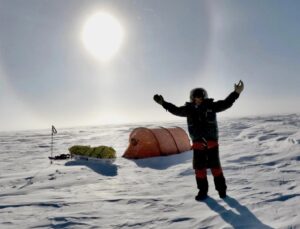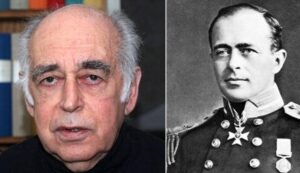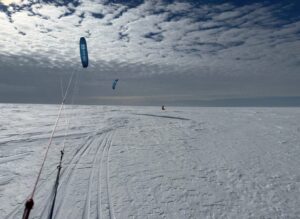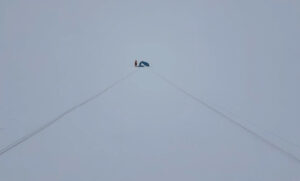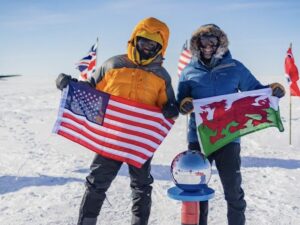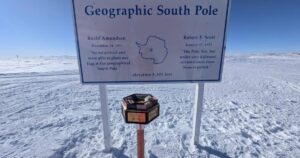“You see, Boss, Wild never gave up hope, and whenever the sea was at all clear of ice, he rolled up his sleeping bag and said to all hands, ‘Roll up your sleeping bags, boys; the Boss may come today’.”
Last month we saw Ernest Shackleton, Frank Worsley and Tom Crean doing the gruelling crossing of the glacier on South Georgia. After reaching Stromness, a relief ship was sent to pick up McNish, Vincent and McCarthy on the other side of the island. A shaven and washed Worsley went with. The three men were “delighted beyond measure.” Without recognizing Worsley, the man they had lived with for 18 months, they expressed their disappointment to him that neither he, nor Shackleton or Crean came with to pick them up.
Meanwhile, Shackleton and Crean slept in a room with electric light and two beds, “warm and soft”, Shackleton wrote, “We were so comfortable that we were unable to sleep.”
To admit failure was hard
Right away Shackleton started to organize the rescue of the 22 men, still in distress on Elephant Island. Moored at South Georgia was one of the largest of the whalers, the Southern Sky, and May 23 they were at sea. The boat made good progress, but the temperature fell very low, and the signs gave Shackleton “some cause for anxiety as to the probability of encountering ice.”
They were about 70 miles from Elephant Island, but there was no possibility of taking the steamer through the ice that barred the way. Heavy pack formed an impenetrable barrier. “To admit failure at this stage was hard, but the facts had to be faced,” wrote Shackleton in his book, South!
They headed to the Falkland Islands, where Shackleton tried again on June 10, on a trawler this time. Again an impenetrable barrier of ice kept them from setting foot in the Elephant Island.
He got to Punta Arenas and £1500 was raised to charter a schooner. On July 12 they were out at sea. Bad weather set in. “After three days of continuous bad weather we were left alone to attempt once more to rescue the twenty-two men on Elephant Island, for whom by this time I entertained very grave fears,” wrote Shackleton.
“This was the third reverse, but I did not abandon my belief that the ice would not remain fast around Elephant Island during the winter, whatever the arm-chair experts at home might say.”
Wild never gave up hope
Back in Punta Arenas again, Shackleton begged the Chilean Government to let him have the Yelcho, a steamer.
August 30 they passed stranded icebergs at Elephant Island and approached the island in thick fog. Worsley’s keen eyes detected the camp, almost invisible under its covering of snow. The men ashore saw them at the same time. The crew saw tiny black figures hurry to the beach and waving signals.
Shackleton hurried the men aboard with all possible speed, taking the records of the Expedition and essential portions of equipment. Everybody was aboard the Yelcho within an hour.
Wild had reckoned that help would come in August, told Shackleton, and every morning he had packed his kit, “in cheerful anticipation that proved infectious.”
Shackleton continued, “One of the party to whom I had said, “Well, you all were packed up ready,” replied, “You see, Boss, Wild never gave up hope, and whenever the sea was at all clear of ice, he rolled up his sleeping bag and said to all hands, ‘Roll up your sleeping bags, boys; the Boss may come today’.”
“And so it came to pass that we suddenly came out of the fog, and, from a black outlook, in an hour all were in safety homeward bound.”
Food situation
The food was eked out with seal and penguin meat, limpets, and seaweed, explained Shackleton. Seals had been scarce, but the supply of penguins had held out fairly well during the first three months. The men were down to the last Bovril ration, the only form of hot drink they had, and had scarcely four days’ food in hand at the time of the rescue.
The camp was in constant danger of being buried by the snow, which drifted heavily from the heights behind, and the men moved the accumulations with what implements they could provide. There was danger that the camp would become completely invisible from the sea, so that a rescue party might look for it in vain.
On August 8, 1914, Ernest Shackleton and his crew set off on the Endurance from Plymouth, England, for the Imperial Trans-Antarctica Expedition. They never set foot on Antarctica, but this 1914-1917 expedition became one of the most heroic, endurance, survival and leadership adventure stories in history. Shackleton brought all 28 men back home alive.
After arriving safe at civilization at Stromness on South Georgia, Shackleton wrote the following in his book ‘South!’:
“When I look back at those days I have no doubt that Providence guided us, not only across those snowfields, but across the storm-white sea that separated Elephant Island from our landing-place on South Georgia. I know that during that long and racking march of thirty-six hours over the unnamed mountains and glaciers of South Georgia it seemed to me often that we were four, not three. I said nothing to my companions on the point, but afterwards Worsley said to me, “Boss, I had a curious feeling on the march that there was another person with us.” Crean confessed to the same idea. One feels “the dearth of human words, the roughness of mortal speech” in trying to describe things intangible, but a record of our journeys would be incomplete without a reference to a subject very near to our hearts.”
#polar #shackleton #southpole #antarctica #centenary

